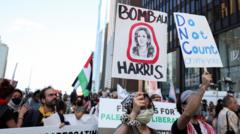The Democratic National Convention begins on Monday in Chicago, in what is expected to be a celebration of Kamala Harris’s nomination as presidential candidate following Joe Biden’s exit.
However protests over the war in Gaza, led by Democrats from the party’s left, threaten to disrupt the unity message.
Thousands of pro-Palestinian protesters are expected near the convention site to show their opposition to President Biden’s policies towards Israel and Gaza, from which Ms Harris, his vice-president, has not deviated.
There will also be events organised by pro-Israel groups, including a “hostage square” to draw attention to the plight of those who remain in Hamas captivity. Relatives of hostages are also expected to attend the convention.
The four-day Democrat spectacle will culminate on Thursday with Ms Harris giving a primetime speech that will be watched by millions of Americans, fewer than three months before election day.
President Biden, the former presidential candidate Hillary Clinton, former president Barack Obama and his wife Michelle and a list of actors and entertainers will give speeches at the United Center in Chicago.
It comes a little over a month after Donald Trump accepted the Republican nomination in Milwaukee, just days after surviving an assassination attempt and as Democrats were in disarray over 81-year-old Mr Biden’s weakness as a candidate.
Since then the momentum of the race has shifted significantly, with Ms Harris’s entry to the race and her running-mate choice of Tim Walz, Minnesota’s governor, jolting enthusiasm and pushing them slightly ahead of Trump and his running mate JD Vance in national polls.
What remains unclear is how the Harris campaign and the Democratic Party will tackle policy towards Israel and the conflict in Gaza.
Israel launched a military campaign in Gaza intending to destroy Hamas after the group attacked southern Israel on 7 October. About 1,200 people were killed and 251 taken hostage. Gaza’s Hamas-run health ministry says more than 40,000 people have since been killed in the campaign in the strip.
Ms Harris has not released a clear policy on Gaza and Israel. She has, however, called for a ceasefire and for the respectful treatment of protesters at her rallies.
She also recently said “far too many” civilians had been killed but did not back a weapons embargo on Israel as some progressives have called for.
The Harris campaign did not respond to a request for comment.
Opposition to the Biden administration’s handling of the conflict caused more than 750,000 people to vote “uncommitted” – rather than for any specific candidate – during the Democratic presidential primary earlier this year.
While the energy of that campaign has ebbed slightly, the presence of that vote in key swing states such as Michigan would still be felt at the convention.
Only three dozen delegates will represent the “uncommitted” vote and they will be greatly outnumbers by the more than 4,500 backing Ms Harris. However, they speak for hundreds of thousands of unsatisfied voters.
In interviews, they said that they intended to spend the convention pressing the Harris campaign and their party to act more forcefully on Gaza.
“We know that this is not a small endeavour. We are challenging a status quo US policy of the past 40 years, and it won’t shift overnight,” said Samuel Doten, a Democratic organiser and “uncommitted” delegate.
Several of the delegates said they hoped to convince fellow Democrats to sign a letter demanding Ms Harris and the party support a ceasefire and arms embargo against Israel.
They said they were not trying to spoil the convention or the election, but were rather pushing the party to adopt a policy popular among Democratic voters.
“There are thousands of voters across the US who voted ‘uncommitted’, so it feels like a huge responsibility for us to present their wishes and to make sure that their voices are being heard and amplified in this party,” said Adrita Rahman, who will attend the DNC for the first time as an “uncommitted” delegate.
It remains to be seen how many people will protest in Chicago against the Gaza war. Organisers had suggested there could be 100,000, but have since said “many, many thousands” on Monday and “tens of thousands” in total by the end of the week.
Monday’s protests will take place before President Biden delivers the night’s main speech.
Ms Harris had earned some goodwill from Gaza protesters as she was one of the first members of the Biden administration to call for a ceasefire, and express a sharper opinion of Israel and Benjamin Netanyahu, the country’s prime minister.
But many protesters said the the vice-president’s honeymoon period is over and they expected to see a policy position that was actionable.
“The people inside the DNC need to know that they have some very unpopular policies. We’re here to tell them,” said protester Irene Alikakos at a protest on Sunday of a few hundred people near Chicago’s Trump Tower.
The DNC will also coincide with a consequential week for the US-mediated ceasefire talks, which the White House has described as being in their “final” stages.
This diplomatic reality could put Ms Harris in a tenuous position.
As a current member of the US administration, it is difficult for her to stray from Mr Biden’s position on Gaza under normal circumstances. It is even more difficult with negotiations potentially coming to a close.
Some close to her have said that, either way, there would be no significant policy shift.
Halie Soifer, who was Ms Harris’s national security adviser in the Senate, said there was “no daylight between” Ms Harris’s views and Mr Biden’s.
“Her policy, which is the policy of this White House, is not changing,” said Ms Soifer, who now leads the Jewish Democratic Council of America.






